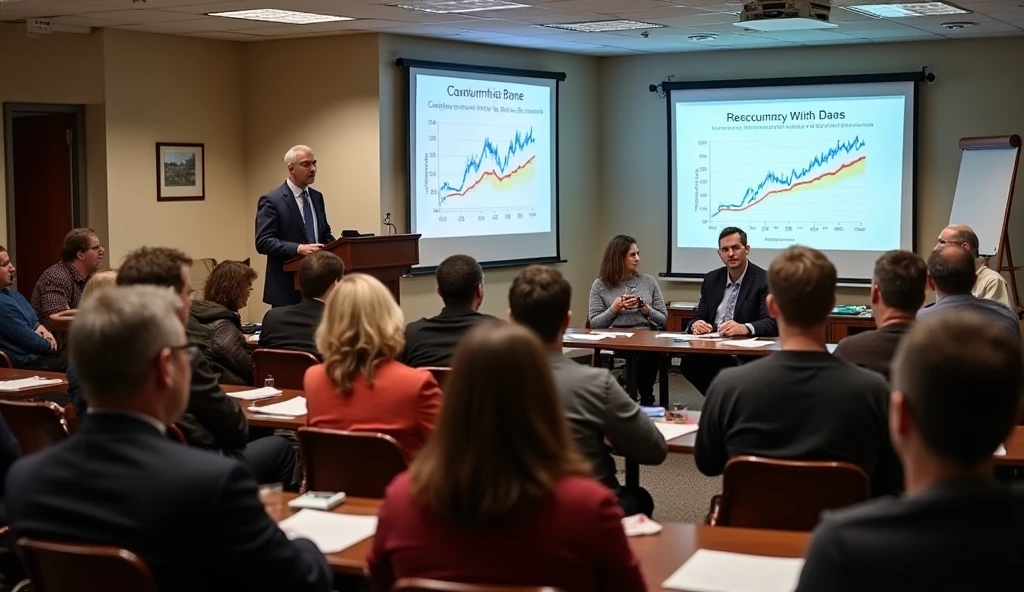1. Understanding the Role of an Auditor in Local Government
In local government operations, the position of the auditor is foundational to transparency, accountability, and financial oversight. In Cuyahoga County, Ohio, the Auditor’s Office serves as a watchdog over public resources, ensuring that taxpayer money is collected, recorded, and used appropriately. Unlike elected officials who primarily shape policy, the auditor’s focus is on the behind-the-scenes functions that make government work efficiently and honestly.

The Cuyahoga County Auditor is tasked with maintaining accurate property records, assessing property values for tax purposes, managing financial records, and auditing various government departments. This responsibility extends across multiple departments and agencies, all of which depend on accurate accounting and reporting to function properly. Without the auditor’s oversight, the risk of mismanagement, inefficiencies, and even fraud increases significantly.
Additionally, the auditor plays a key role in verifying that financial transactions comply with both state and federal regulations. Whether it’s evaluating grant allocations, reviewing municipal contracts, or analyzing departmental expenditures, the auditor serves as the county’s internal financial compass. Their work directly impacts how well services like public safety, education, and infrastructure are funded and sustained.
For residents of Cuyahoga County, this means that the auditor is not just a figure behind the desk but a critical part of ensuring government serves the people fairly. Every time taxes are assessed or a public fund is distributed, the auditor’s presence is silently embedded in the process, maintaining order and trust. Understanding this role is essential to appreciating how local government stays accountable in a democratic system.
2. Why Auditing is Critical for Government Accountability
Government accountability is not merely a goal—it is a necessity, especially when it comes to the management of public funds. In Ohio’s Cuyahoga County, the Auditor’s Office plays a crucial role in holding local government departments and officials accountable for their financial practices. Regular audits ensure that every dollar collected from residents through taxes is tracked, recorded, and spent responsibly.
Auditing in local government is essential to identify inefficiencies, reduce waste, and detect irregularities before they escalate into major issues. For example, through performance audits, the Cuyahoga County Auditor’s Office evaluates how effectively programs and departments are operating. These findings often lead to actionable recommendations that improve service delivery and reduce unnecessary expenses—directly benefiting taxpayers.

Accountability also hinges on the auditor’s ability to assess risk and implement internal controls. These systems prevent unauthorized spending, fraud, or misallocation of funds. The auditor not only reports issues when they occur but also anticipates potential vulnerabilities, creating a financial environment that prioritizes integrity over convenience.
Additionally, publicly released audit reports offer transparency into government functions. Residents of Cuyahoga County can review these documents to understand how their money is being used and where improvements are being made. This not only reinforces trust in the system but also empowers citizens to demand better performance from their local government.
In short, the auditing process is vital to maintaining the legitimacy of public institutions. It ensures that leaders are not just entrusted with funds but are constantly monitored in how they manage them. In a region as dynamic as Cuyahoga County, strong auditing practices are a cornerstone of reliable governance.
3. Types of Audits Conducted in Cuyahoga County
The scope of auditing performed by the Cuyahoga County Auditor’s Office is broad and multifaceted, reflecting the complexity of managing a large and diverse county. These audits fall into several categories, each designed to examine specific aspects of government operations and finances.
One of the most common types is the financial audit, which ensures that the county’s financial statements are accurate and comply with accepted accounting standards. These audits are essential for verifying that funds are being managed according to laws and that the numbers reported to the public truly reflect the county’s financial condition.
Another important category is the performance audit. These evaluations go beyond the numbers to assess how well government programs and departments are functioning. For instance, a performance audit might look into the efficiency of road maintenance services or the effectiveness of emergency response units. The goal is not just to identify shortcomings but to provide recommendations that lead to better outcomes for the public.
Compliance audits are also a key part of the auditor’s toolkit. These reviews check whether county departments are adhering to rules, contracts, and legal requirements. For example, when state or federal grants are used, a compliance audit ensures the funds are spent in accordance with the original agreement. Failure to comply can result in financial penalties or loss of funding, making these audits essential for continued operations.

Each type of audit conducted in Cuyahoga County serves a unique purpose, but together they form a comprehensive strategy for oversight. They help ensure that county operations remain transparent, accountable, and efficient. Residents benefit from knowing that the local government is being regularly and professionally evaluated—an assurance that their tax dollars are in good hands.
4. The Auditor’s Role in Budget Oversight and Fiscal Responsibility
In Cuyahoga County, fiscal responsibility is a central pillar of good governance, and the Auditor’s Office plays a vital role in maintaining it. The auditor doesn’t just monitor money after it’s spent — they are actively involved in the budgetary planning process to ensure that all expenditures align with the county’s financial objectives and legal requirements.
One of the key functions of the auditor in this context is to provide reliable financial data that policymakers and departmental leaders use when making budgetary decisions. Whether it’s allocating funds for public health programs or approving capital improvements, those decisions are only as sound as the data behind them. The auditor guarantees that data is accurate, up-to-date, and reflective of actual county conditions.
Moreover, the auditor continuously evaluates whether departments stay within their approved budgets. This isn’t just about spotting overspending — it’s about identifying trends that could lead to budget shortfalls or financial instability. Through regular monitoring and internal financial audits, the auditor ensures that taxpayer dollars are being managed with the highest level of care and efficiency.
In times of economic uncertainty, such as recessions or unexpected public health crises, the auditor also provides financial forecasting and risk analysis to help the county prepare for potential revenue declines. This allows for more flexible and proactive budgeting, protecting essential services from disruption.
Ultimately, the auditor acts as the county’s financial conscience — a steady voice reminding all departments to remain transparent, prudent, and aligned with the county’s mission. In Cuyahoga County, this role is essential to preserving public trust and sustaining long-term growth while avoiding financial pitfalls.
5. Ensuring Ethical Practices and Preventing Fraud in Public Offices
Ethics and integrity are fundamental to the effectiveness of local government, and the Auditor’s Office in Cuyahoga County serves as a critical safeguard against corruption and misconduct. Public offices manage large budgets, sensitive information, and make decisions that impact thousands of lives—making them prime targets for fraud or unethical behavior if not properly monitored.
The auditor ensures ethical practices by establishing internal control systems across departments. These controls are policies and procedures designed to detect and prevent misuse of funds, unauthorized transactions, or conflicts of interest. They act as checks and balances that make it harder for any one individual or department to exploit the system.
Additionally, the auditor conducts special investigative audits when allegations or suspicions of misconduct arise. These audits are focused, detailed inquiries that trace financial activity to uncover wrongdoing. Whether it’s an irregular contract approval, ghost employee scheme, or unjustified expenditures, the auditor’s office has the authority and tools to investigate and report these issues.
Cuyahoga County also promotes ethical conduct through transparency. The Auditor’s Office often publishes audit results, findings, and follow-up actions that keep the public informed. This openness holds agencies accountable and discourages unethical behavior by increasing the likelihood of detection.
Furthermore, the auditor works closely with law enforcement and oversight bodies in cases involving suspected criminal behavior. This inter-agency cooperation ensures that any financial crime within the county government is handled swiftly and justly, preserving the integrity of public services.

For the residents of Cuyahoga County, this means peace of mind. Knowing there’s a professional, independent authority monitoring ethical conduct within local government ensures confidence in the system, and creates a culture where integrity is not optional, but expected.
6. How Auditors Improve Public Trust in Local Government
Public trust is the cornerstone of a healthy democracy, and the role of the auditor in Cuyahoga County is directly tied to building and preserving that trust. In an era where skepticism toward government operations is common, consistent and transparent auditing practices help bridge the gap between citizens and public institutions.
One of the primary ways auditors build trust is by providing clear, verifiable financial information to the public. When residents know how their tax dollars are being spent, and that spending is being reviewed by a neutral authority, they are more likely to feel confident in their local government’s decisions. This transparency reduces doubt and discourages rumors or misinformation.
The Auditor’s Office also improves trust by ensuring fairness in property assessments and taxation. In Cuyahoga County, where property taxes fund essential services like education, roads, and public safety, the auditor’s job is to ensure that each property is assessed accurately and equitably. Mistakes or inconsistencies in property values can lead to frustration and appeals — but consistent auditing helps prevent these issues and provides a fair playing field for all residents.
Publicly accessible audit reports are another key factor in reinforcing accountability. These reports are not buried in technical jargon — they are made available for public review, often with summaries or presentations that make complex data more digestible. This empowers citizens to ask questions, stay engaged, and hold officials accountable.
Finally, the auditor’s presence serves as a deterrent to unethical or wasteful behavior within local government offices. Officials and department heads are more likely to follow proper procedures when they know a thorough audit is on the horizon.
In short, the Cuyahoga County Auditor is more than a behind-the-scenes financial officer — they are a guardian of public confidence. Through vigilance, transparency, and impartiality, auditors contribute directly to a stronger, more trusted local government.
7. Supporting Public Programs Through Accurate Financial Monitoring
In Cuyahoga County, public programs — whether focused on education, housing, transportation, or public safety — rely on precise budgeting and timely funding. Behind the scenes, the Auditor’s Office plays a key role in ensuring these initiatives operate efficiently through ongoing financial monitoring and performance audits.
This involves tracking how funds are allocated, disbursed, and ultimately utilized across each department. The auditor reviews whether program budgets are being followed, whether actual spending aligns with approved plans, and whether the outcomes meet their intended goals. For example, if a public health program received $2 million for outreach and community services, the auditor ensures the money wasn’t diverted to unrelated expenses or administrative overhead.
Accurate financial monitoring also highlights inefficiencies or underutilized funds, which the county can then redirect to areas with greater need. In some cases, the auditor may even recommend budget restructuring to improve program impact. This ensures every tax dollar serves a tangible purpose and maximizes community benefit.
In addition, the auditor verifies compliance with local, state, and federal regulations tied to specific funding streams. Many public programs are supported by grants that come with strict usage conditions — and mismanagement could mean penalties or loss of funding. The auditor’s oversight helps Cuyahoga County maintain its eligibility for these critical resources.
By holding public programs accountable and ensuring fiscal discipline, the auditor helps enhance their success, maintain public confidence, and ensure that residents of Cuyahoga County receive the full benefits of taxpayer-supported services.
8. Collaborating with Departments to Streamline Financial Processes
The Cuyahoga County Auditor’s role is not limited to oversight — it also involves close collaboration with other departments to improve internal financial processes. This cooperative approach is essential for streamlining operations, minimizing red tape, and reducing the potential for costly errors.
Departments often face challenges when managing complex budgets, processing vendor payments, or handling payroll systems. Here, the auditor provides guidance on best practices and implements systems that simplify these processes. For instance, introducing uniform accounting software across departments ensures consistency in financial reporting and reduces human error.
Training is another crucial area where the auditor adds value. Staff members in various departments may not have specialized financial backgrounds, so the Auditor’s Office often offers workshops or internal support to help them understand compliance standards, documentation protocols, and audit readiness. This proactive support helps prevent issues before they occur and fosters a more financially literate workforce.
The auditor also plays a lead role in modernizing workflows. This might involve transitioning from paper-based systems to digital reporting, enabling faster processing times and better data security. In Cuyahoga County, where government efficiency directly impacts thousands of residents, these improvements have a real-world effect — whether it’s getting a permit processed faster or ensuring social service payments go out on time.
By working together with various county offices, the Auditor helps eliminate duplication, increase transparency, and create a seamless financial operation that supports the county’s long-term success. It’s a strategic partnership focused not just on fixing problems, but on building a stronger system from within.
9. Providing Key Insights for Policy and Planning Decisions
Data is at the heart of every effective policy — and the Cuyahoga County Auditor plays a major role in delivering the data that drives smart decision-making. Through comprehensive audits, revenue tracking, and expenditure reviews, the Auditor’s Office provides insights that help local leaders set priorities, allocate resources, and craft policy with confidence.
For example, if a new policy is being considered to expand affordable housing, the auditor can provide historical spending trends, projected cost analysis, and financial risk evaluations. This type of objective information allows lawmakers and departmental heads to avoid costly mistakes and plan with a clearer picture of fiscal reality.
The Auditor’s Office also evaluates how existing policies impact the county’s budget. If a new initiative is overextending resources or underperforming, the auditor’s data can highlight those issues early. Conversely, successful programs identified through financial reviews can be used as models for future expansion or duplication in other areas.
In addition, the auditor’s analysis supports long-term planning. Whether the county is planning infrastructure investments, upgrading technology, or launching a public health campaign, the auditor’s forecasts and reports help ensure these efforts are financially sustainable. The office provides not just present-day financial clarity but also projections that guide future growth.
By supplying unbiased and in-depth financial data, the Cuyahoga County Auditor empowers decision-makers to move from assumption to evidence. This leads to policies that are not only well-intentioned but also financially feasible and impactful — a win for the government and for the citizens it serves.
Conclusion: The Integral Role of the Auditor in Cuyahoga County’s Local Government
The role of the auditor in Cuyahoga County is not just about reviewing numbers or ensuring compliance — it is about upholding the principles of transparency, accountability, and ethical governance in the local government. Through rigorous financial oversight, collaboration with county departments, and providing valuable data-driven insights, the auditor contributes to ensuring that taxpayer dollars are spent wisely, efficiently, and effectively.
From budgetary management and fiscal responsibility to investigating fraud and supporting public programs, the auditor’s office plays a pivotal role in maintaining the county’s financial health and public trust. By conducting thorough audits and implementing proactive measures, the auditor not only protects residents from potential financial mismanagement but also ensures that local government operates smoothly, ethically, and with integrity.
For the residents of Cuyahoga County, this role is invaluable in sustaining confidence in their local government. The auditor serves as a watchdog, safeguarding taxpayer funds, promoting fairness, and ensuring that government operations meet the highest standards of public accountability. As the county continues to grow and evolve, the auditor’s commitment to financial transparency remains an essential pillar of good governance, benefiting the entire community and helping to ensure a future where financial integrity is always prioritized.
Through continuous improvement, collaboration, and vigilant oversight, the Cuyahoga County Auditor’s Office remains steadfast in its mission to serve and protect the interests of both the local government and its residents.
1. What are the specific financial duties of the Cuyahoga County Auditor?
The Cuyahoga County Auditor is responsible for overseeing the county’s finances, ensuring accuracy and transparency in financial reporting. Key duties include budgetary oversight, conducting audits, and ensuring internal controls are in place across various county departments. The auditor also ensures that funds are allocated appropriately to public programs and projects. By maintaining these functions, the auditor helps prevent financial mismanagement and promotes accountability in the use of taxpayer dollars. The office also plays a crucial role in forecasting and risk management, ensuring the county can plan for potential future financial challenges.
2. How does the Cuyahoga County Auditor prevent fraud in government operations?
The Cuyahoga County Auditor prevents fraud through stringent internal control measures and regular audits. These controls are designed to spot irregularities in financial transactions, unauthorized spending, and any signs of fraudulent activities within government departments. The auditor’s office also conducts special investigations when suspicions arise. These checks ensure that public funds are not misused, and departments comply with ethical standards. By providing transparent reporting and regular audits, the auditor holds county employees accountable, thus reducing the risk of fraud.
3. How does the Auditor collaborate with other county departments to improve financial processes?
The Auditor’s Office collaborates with other county departments to streamline financial processes and improve efficiency. This collaboration often includes training workshops on best practices in financial management, adopting standardized accounting systems, and advising departments on cost-saving strategies. The goal is to eliminate redundancies, reduce errors, and ensure that departments are operating within their financial means. The auditor’s office also plays an integral role in modernizing the county’s financial systems, moving from outdated paper-based processes to more efficient digital platforms.
4. Why is the Auditor’s role in budgeting critical for Cuyahoga County?
The auditor plays a crucial role in Cuyahoga County’s budgetary process by ensuring accurate data is used in planning and allocation decisions. By auditing spending and reviewing budget proposals, the auditor ensures that county funds are spent responsibly and in accordance with approved plans. The auditor’s office also identifies potential budgetary gaps and makes recommendations for reallocating resources as needed. This ensures that essential services are prioritized and that the county’s fiscal health remains stable, even in times of economic uncertainty.
5. How does the Cuyahoga County Auditor support public transparency?
Transparency is a core function of the Cuyahoga County Auditor’s office. The auditor ensures that all financial data is accessible to the public through audit reports, budget reviews, and performance assessments. These reports are published in a clear and concise manner, making it easy for residents to understand how their tax dollars are being spent. This transparency helps build trust between the local government and the community, as citizens are kept informed about how funds are managed and how programs are evaluated for effectiveness.
6. What steps does the Cuyahoga County Auditor take to ensure accurate property tax assessments?
The Auditor’s Office in Cuyahoga County is responsible for conducting fair and accurate property tax assessments. The process involves analyzing property values based on market data, historical trends, and the condition of the property. The auditor ensures that the assessment is equitable and consistent across all properties, preventing discrepancies that could lead to unfair tax burdens. Property owners are given opportunities to appeal their assessments if they believe their property has been incorrectly valued, and the auditor’s office is involved in resolving these disputes fairly.
7. How does the Cuyahoga County Auditor contribute to the county’s long-term financial planning?
The Cuyahoga County Auditor contributes to long-term financial planning by providing detailed financial forecasts and trend analysis. These reports help decision-makers understand future revenue patterns, spending needs, and potential risks to the county’s fiscal health. The auditor’s office also helps in setting aside contingency funds for unexpected financial needs, thus supporting sustainable growth and long-term planning. This proactive approach ensures that the county can handle economic challenges without compromising essential public services.
8. What is the role of the Auditor in managing county debt?
The Cuyahoga County Auditor plays an important role in managing county debt by overseeing the issuance of bonds, ensuring the county remains within its debt limits, and monitoring debt servicing. The auditor ensures that all borrowing is properly authorized and that the county maintains its creditworthiness. Through audits, the auditor tracks the county’s debt obligations and ensures that any payments made towards debt reduction align with the financial plans approved by local government authorities.
9. How does the Cuyahoga County Auditor ensure ethical financial practices in government offices?
Ethical financial practices are ensured by the Cuyahoga County Auditor through comprehensive audits, regular checks, and the implementation of robust internal controls. The auditor’s office conducts routine evaluations of financial processes to ensure compliance with legal and ethical standards. Any discrepancies, waste, or misuse of funds are promptly investigated and addressed. Moreover, the auditor collaborates with county leadership to establish and reinforce policies that uphold integrity and discourage unethical behavior within government offices.
10. What role does the Auditor play in property valuation appeals?
The Cuyahoga County Auditor’s Office provides a key role in overseeing the property valuation appeal process. Property owners who believe their property assessments are incorrect can file an appeal, and the auditor’s office reviews these claims to ensure accuracy. The auditor works with independent appraisers and uses comprehensive data analysis to reassess property values. This impartial role ensures that property owners have a fair process for challenging their assessments, thus ensuring equitable property tax obligations for all residents.
11. How does the Auditor’s Office assist in ensuring compliance with state and federal financial regulations?
The Cuyahoga County Auditor’s Office ensures compliance with state and federal financial regulations by conducting regular audits and assessments of county departments. These audits ensure that all funds allocated by the state and federal governments are used in accordance with their intended purposes. The auditor’s office helps departments navigate complex regulatory requirements, ensuring all financial transactions are properly documented and compliant with the law. This minimizes the risk of penalties or funding cuts due to non-compliance.
12. How does the Cuyahoga County Auditor manage public feedback on financial reports?
The Cuyahoga County Auditor encourages public feedback by making financial reports accessible online and holding public forums where residents can ask questions or voice concerns about county finances. The auditor also maintains open lines of communication with citizens through emails, phone calls, and in-person consultations. This feedback loop allows the auditor to address concerns, clarify financial details, and make adjustments where necessary, enhancing public engagement and maintaining trust in the county’s financial management.
13. What impact does the Auditor have on public trust in government?
The Cuyahoga County Auditor plays a central role in building and maintaining public trust in local government by ensuring transparency, accountability, and financial responsibility. By providing clear, unbiased financial data and conducting independent audits, the auditor reinforces the perception that government operations are honest and in the best interest of the community. As a result, residents feel more confident that their tax dollars are being used effectively, which strengthens public faith in local governance.
14. How does the Auditor’s Office impact the efficiency of public services?
The efficiency of public services in Cuyahoga County is greatly enhanced by the Auditor’s Office. Through financial audits and performance assessments, the auditor identifies inefficiencies in how public funds are allocated and spent. By recommending improvements and reallocating resources to areas of greater need, the auditor ensures that public services remain effective and cost-efficient. Additionally, the office helps streamline government processes, allowing for faster service delivery and reducing bureaucratic delays.
15. What measures does the Auditor take to stay transparent in government spending?
To maintain transparency in government spending, the Cuyahoga County Auditor publishes detailed audit results, budget reviews, and spending reports that are accessible to the public. These reports break down where and how public funds are being used and highlight any discrepancies or areas of concern. The auditor’s office also actively participates in public forums and community outreach to explain audit findings and respond to any questions, ensuring full transparency in the county’s financial management.

Pingback: Comprehensive Guide to Cuyahoga County Sales Tax